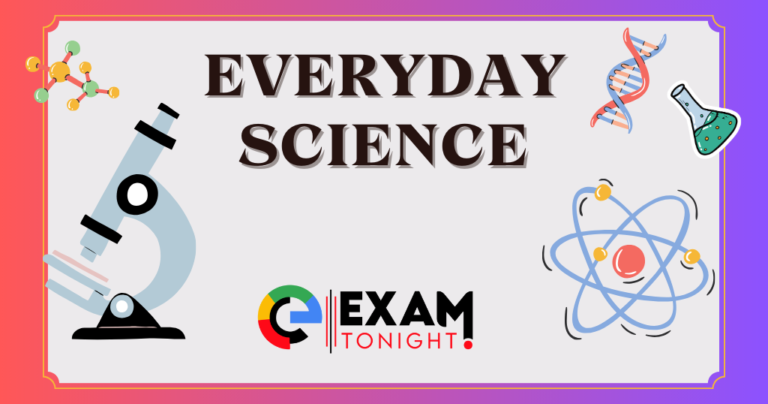Everyday Science MCQs

Everyday science Multiple Choice Questions (MCQs) typically cover a wide range of topics including physics, chemistry, biology, earth sciences, astronomy, health, and medicine. Our online everyday science-based test will prepare you for academic success in exams. Here you may discover the most repeated everyday science MCQs, comprehensive explanations of the questions as well as their answers. Every exam given by organizations such as the Federal Public Service Commission (FPSC), Khyber Pakhtunkhwa Public Service Commission (KPPSC), Punjab Public Service Commission (PPSC), Sindh Public Service Commission (SPSC), Balochistan Public Service Commission (BPSC), Azad Jammu & Kashmir Public Service Commission (AJKPSC), National Testing Service of Pakistan (NTS), Pak Army, Navy, PAF, ISSB, and others includes a General Science multiple-choice question (MCQ).
Be a part of our community! Share your latest MCQs on everyday science with us by Submitting them here. Your valuable contributions enhance the learning experience for everyone.
A. to provide music when the train is moving
B. because steel is in short supply
C. to provide for directional changes
D. to neutralize the expansion of lines
A. locating and diagnosing muscle and nerve abnormalities
B. recording of electric potential changes at each heart beat
C. measuring electricity
D. generating statistcal electricity by induction.
A. on freezing, the resulting ice becomes harder
B. it expands in volume considerably
C. there is a difference of temperature within and outside the pipe
D. the air trapped in the pipe exerts its pressure to burst the pipe.
A. carbohydrates
B. proteins
C. vitamin B
D. vitamins A and C
A. It is the pressure that the blood clot exerts over the brain
B. It is the pressure that blood receives on account of faulty commands from the brain
C. It is the pressure that fatness or old age exerts on the body’s circulatory system
D. It is the amount of pressure on the blood as a result of the heart’s pumping function and the resistance of the arterial walls
A. give rest to the tired eyes
B. give lubrication to the eyes
C. prevent dust from entering the eyes
D. perform an act of habit only
A. 10,000 times
B. 16,000 times
C. 22,000 times
D. 84,000 times
A. any reaction
B. fission
C. fusion
D. either fission or fusion
A. copper
B. silver
C. gold
D. lead
A. of a special clay used in making it
B. clay heats up slowly as also loses coolness slowly
C. pitcher’s porous build promotes evaporation and consequent cooling
D. pot water does not come into contact with outside heat
